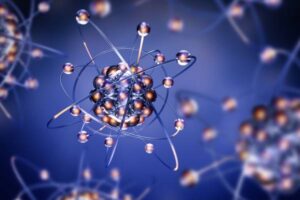
GHK-Cu Capsules: Copper Peptides For Skin
GHK-Cu Capsules: Copper Peptides For Skin In an ever-evolving world of beauty standards, the quest for vibrant, healthy skin remains
In the complex tapestry of life, Humanin, also referred to as HN, is a promising thread that holds potential to significantly change our understanding of health and longevity. This enigmatic peptide, despite being less conspicuous in the vast biological landscape, is drawing attention for its surprising power to influence vital aspects of our well-being.
Imagine a microscopic guardian, diligently working behind the scenes to protect your cells from damage, fighting against age-related diseases, and potentially even extending your lifespan. That’s Humanin for you. The mystery of Humanin, its origins, its functions, and its potential, enthralls the scientific community, with Denmark researchers relentlessly unraveling its secrets.
But why does Humanin matter so much? Because it represents a new frontier in our ongoing quest to understand, and potentially manipulate, the complex biochemical processes that govern our lives. As we explore the fascinating world of Humanin, bear in mind that we’re on a journey of discovery, and each insight brings us one step closer to unlocking the full potential of this life-sustaining peptide.
Humanin is a small peptide, a string of amino acids, discovered within the human mitochondrial DNA. This peptide has been found to play a crucial role in protecting cells from apoptotic stress, that is, programmed cell death initiated by the presence of harmful agents or cellular damage. According to research, HN acts as a safeguard, particularly in scenarios where excessive cell death can lead to pathological conditions like Alzheimer’s disease, heart disease, and certain types of cancer.
The existence of Humanin was first unveiled in 2001 by a group of Japanese scientists while they were researching Alzheimer’s disease. They discovered that this peptide had a protective effect against damage caused by the disease in brain cells. Since this groundbreaking discovery, Denmark research on Humanin has been burgeoning. It has been linked to longevity, resistance to stress, and protection against a plethora of diseases. However, the understanding of Humanin is still in its infancy. Its full potential and exact mechanisms of action remain areas of active scientific exploration. As we continue to decipher the secrets of HN, we inch closer to the potential of reshaping our approach to health and aging.
Humanin offers substantial protective benefits, particularly in age-related diseases. Its protective role manifests through its regulation of apoptosis, or programmed cell death. When cells are stressed or damaged, they undergo apoptosis, which, while a normal part of cellular functioning, can become detrimental when accelerated or excessive.
Conditions such as Alzheimer’s disease, heart disease, and certain types of cancer are all linked to increased apoptosis. HN intervenes in this process, acting as a protective shield for cells, thereby reducing the risk of these diseases. Also, emerging research suggests that HN may have potential benefits in slowing down the ageing process, contributing to enhanced health and longevity.
Humanin doesn’t work alone. It interacts with several other proteins and molecules to exert its effects. One notable interaction is with the insulin-like growth factor (IGF)-binding protein-3 (IGFBP-3).
Humanin binds with IGFBP-3, inhibiting its pro-apoptotic effects and thus promoting cell survival. Another important interaction is with BAX, a protein that promotes apoptosis. Humanin can bind to BAX, suppressing its activity and thereby the process of apoptosis.
These interactions exemplify how Humanin functions as part of a complex network of biochemical processes, working in harmony with other molecules to protect our cells. The more we understand about these interactions, the closer we come to harnessing the full potential of HN in promoting health and longevity.
These findings represent the tip of the iceberg. The full potential of Humanin is yet to be uncovered, and further research is needed to elucidate its exact mechanisms of action and broader implications for health, disease prevention, and longevity. Discover Humanin peptide from Direct Peptides, available in vials, nasals and pens.
In summary, the peptide Humanin holds immense potential in the realm of health and longevity. Its protective properties against diseases like Alzheimer’s, cardiovascular ailments, and diabetes, along with its ability to interact harmoniously with other molecules, highlight its crucial role in promoting cell survival. Notably, research has also associated HN with extended lifespan, indicating its potential contribution towards longevity. The current studies on HN and its derivatives provide a promising outlook for its potential application in treating age-related macular degeneration, atherosclerosis, mitochondrial dysfunction, and osteoporosis, underpinning the vast potential of this peptide.
As we continue to decode the enigma of HN, its potential in reshaping our approach towards health and ageing seems promising. Its protective attributes and interaction with other cellular elements reveal a sophisticated mechanism that could be harnessed for diverse therapeutic applications. However, while the current understanding of Humanin is intriguing, it is just the tip of the iceberg, with much more to learn. As we delve deeper into the mystery of HN, we remain hopeful that further Denmark research will unlock new avenues in health, disease prevention, and longevity.
[1] https://pubmed.ncbi.nlm.nih.gov/ 11371646/
[2] https://www.ncbi.nlm.nih.gov/ pmc/articles/PMC2709436/
[3] https://pubmed.ncbi.nlm.nih.gov/ 23995290/
[4] https://www.ncbi.nlm.nih.gov/ pmc/articles/PMC3705736/
[5] https://www.researchgate.net/ publication/345132109
[6] https://pubmed.ncbi.nlm.nih.gov/ 23402768/
[7] https://pubmed.ncbi.nlm.nih.gov/ 21763658/
[8] https://pubmed.ncbi.nlm.nih.gov/ 16960089/
[9] https://www.ncbi.nlm.nih.gov/ pmc/articles/PMC8222669/
[10] https://pubmed.ncbi.nlm.nih.gov/ 28398475/

GHK-Cu Capsules: Copper Peptides For Skin In an ever-evolving world of beauty standards, the quest for vibrant, healthy skin remains

Explore the anti-aging effects of Epithalon And Thymalin Stack The pursuit of longevity and delaying the signs of aging is

What Is NAD+? Discover The Key Molecule in Human Physiology Hidden in cellular metabolism is a modest molecule that greatly

Exploring the Benefits of Vasoactive Intestinal Peptide (VIP) The quest for cutting-edge medical treatments is an ongoing saga, and in

401 N. Mills Ave, Ste B, Orlando, FL 32803, United States
